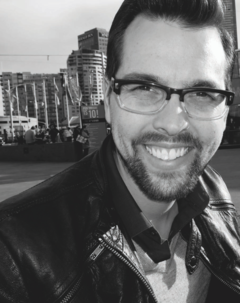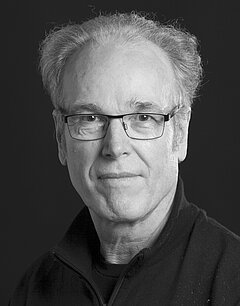Theatre
Interview with directors Alister Smith & Tony Smith, Australia
How do you prepare yourself for the international Folkwang Shakespeare Festival?
Preparations have been in train since 2014. There has been a significant fundraising campaign that students and staff of VCA and the University of Melbourne have supported. Rehearsals commenced in February 2016. The world and characters’ relationships have been initially explored through improvisation with an emphasis on the action of the play revealed through the form of Shakespeare’s language. The world and story have then been filled, enriched and detailed through physical action, sound and lighting.
Which significance does the festival have for the acting department of your school?
This festival is very significant for the VCA Theatre department and will have a major impact on our students' training and experience. The department encourages and endorses international events such as this festival that enhances artistic development and networking opportunities.
What is the main idea of your performance?
The world of this production is one of inherited wealth, new wealth, corporate takeover, and social climbing. The play is peopled with characters who are vulnerable, vengeful, fragile and fallible, with foibles, dishonesties and a lot of free time. Love, loyalty, disloyalty, status, honour and gender politics pepper relationships.
Do you have expectations related to the time in Essen? Which ones?
It would be wonderful if there were classes and workshops scheduled for students that were led by teacher directors as well as the rehearsals for the international production. A panel immediately after each school’s performance for audience members would also be invaluable and would support the exchange of ideas and art practice among the directors, teachers and students.
Do you have any associations when it comes to the Folkwang University of the Arts?
Tony: I attended the 2013 Folkwang Shakespeare Festival.
Alister: This is my first production for Folkwang Shakespeare Festival.
How do you exchange with the management of the festival?
Exchange visits. Predominantly via Email.
A Contribution by director Brian Michaels, Poland
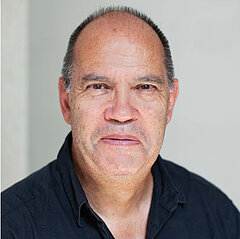
Photo: Nina Gschlößl
As a co-founder of the International Shakespeare Festival in 2001, I have been able watch it develop and grow over a period of 15 years. What started out as an adventure into uncharted waters, has become a repeatable expedition into the possibilities of theatre as a universal, trans-national language. Shakespeare’s plays have always given the participants the opportunity to transcend the limiting quality of different tongues, and to develop their own specific Shakespearean language and aesthetic, which becomes accessible for everyone. The creative “madness” of producing the international version of the chosen play in 3 days with as many as 70 actors - a kind of marathon sprint to the agreed deadline/showtime - explodes borders and barriers on all possible levels. We have to function as a social cultural team, pooling energy, inspiration and perspiration. The collective energy of these 3 days is unique, and provides an unforgettable experience for all those involved.
The Polish students are fascinated and excited by the prospect of the encounter with students from South Africa, Australia and Germany. They are fully aware of the opportunity that this festival offers them. They are not coming just to present their work, and participate in the final Shakespearean madness, but to open their eyes, minds and hearts to all who will be part of the festival. The non-competitive nature of the International Shakespeare Festival Essen allows the students to meet each other without fear or jealousy, on the contrary, the enthusiastic curiosity that the event provokes, paves the way for a joyful celebration of theatre and its greatest ever practitioner - William Shakespeare.
Brian Michaels, March 11 2016
Interview with director Deborah Arlene Lütge, South Africa
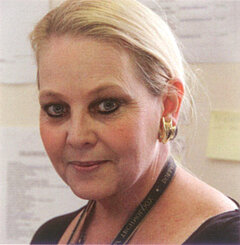
Photo: Morgan Kisten
How do you prepare yourself for the international Folkwang Shakespeare Festival?
The preparation for the International Folkwang Shakespeare Festival is slightly different from a production mounted at home because of escalated costs and the fact that the production is required to travel light. Our journey to the Folkwang Shakespeare Festival started with a search for funding, a cast that do not speak English as a first language, and a concept that allows evidence of region, province and country without weighing too much.
For a South African director mounting a work to transport overseas overcoming the first hurdle means securing funding. I was relieved that first the Folkwang Shakespeare Festival offers a monetary incentive and indeed very fortunate in the support of colleagues. The work produced is a tribute to their recommendations and determination: Prof Ahmed Bawa our indomitable Vice Chancellor, Prof Graham Stewart for recommending me as a director, Dr Lavern Samuels from the International Office and Alan Khan from Corporate affairs for driving the process and our dynamic Faculty of Arts and Design Executive Dean, Dr Rene Alicia Smith for supporting this project as well as our Deputy Dean and Shakespeare expert Prof Brian Pearce for making sure that administrative processes are also on track.
Tackling the language meant unpacking meaning and finding signifying points of cultural reference. We have used a few isiZulu words here and there to add an indigenous South African contemporary flavor and added in two imbongi isiZulu orators, one to greet Leonato and family and Antonio’s wedding tribute. We considered direct translations and in fact began with the messenger’s dialogue at the beginning of the play but even in these opening lines direct translations proved extremely difficult and as the intention was a celebration of Shakespeare rather than an adaptation from Shakespeare we opted for a predominantly English-based text infused with African costumes and contexts.
The context marries multiple cultural stimuli and represents a modern South Africa inscribed with merged intra-cultural influences negotiating unique social environments and circumstances driven by progress, economics and global interaction. Modernization counters reductionist values and in South Africa, the youth begins to embrace commonly shared issues on social platforms, the shifts or changes incurred by socio-political flux and the individual redefinition of self within socio-cultural parameters.
Which significance does the festival have for the acting department of your school?
The invitation to the Folkwang Shakespeare Festival provides an opportunity for international artistic exchange, the prospect of different international interpretations collaborating, the ability for students and staff to enter a new global space with fresh expectations that open a Shakespearean text to uniquely different visions and an opportunity to share values in person (knowledge centred in the psychomotor, cognitive and affective domains) across national borders. The final collaborative performance offers an occasion to openly link with other artists in communication and solidarity and become truly a part of the global village.
What is the main idea of your performance?
South Africa has eleven official languages. EThekwini, Durban, part of the ‘Kingdom of the Zulu’ and the city from which we hail, is regarded as a cultural melting pot. IsiZulu is the language most spoken in the region of KwaZulu-Natal. Therefore we have interspersed a few isiZulu translations to reflect our region but retained a predominantly English text in order to make our production accessible to more audiences in and outside the country. Our sets feature typical Ndebele design painted on cardboard boxes set on wheels, with a cardboard design on the stage floor in order to set the production in a South African cultural setting. Our costumes are an indigenous African contemporary mix retaining beads and some African headdresses, while our dance is centred in gumboot, pantsula, township jive, and our original music by the cast includes Shembe elements, urban jive composed of syncopated street rhythms, isicathamiya (the acapella style made famous by Ladysmith Black Mambazo) - all modern styles interspersed with drums, horn, and guitar backing the voices.
Do you have expectations related to the time in Essen? Which ones?
This eleven day visit affords the Durban University of Technology a chance to share a global platform, to embrace artistic interaction and to bring back what has been discovered in order to share what has been gleaned with other students. Further it allows us to benchmark training against international standards.
Do you have any associations when it comes to the Folkwang University of the Arts?
This is our first partnership but we hope this will form a longstanding relationship with possible future exchange.
How do you exchange with the management of the festival?
Thus far we have met with Prof H.-D. Schmidt who inspired us with his vision on a visit to the Durban University of Technology, Drama and Production Studies Department in September 2014. Prof Schmidt’s was accompanied by Ms Susanne Skipiol who has kindly and promptly responded to all our institutional queries with a generosity of spirit that allows each participant to feel supported. Therefore the Management of this festival has been excellent. It is efficient, structured, informative and warm.
Interview with Mirjam Kuchinke and Halina Jäkel, students at the Folkwang University of the Arts
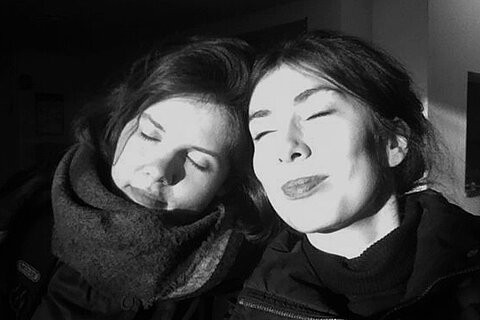
Photo: Mirjam Kuchinke und Halina Jäkel
What do you expect from the international Folkwang Shakespeare Festival?
At first we wish all of us who are interested in theatre and its working process a really good time. An intense time at best – what is more unique than so many different cultural backgrounds coming together and wanting to be heard. Four completely distinctive interpretations of one play – we are excited! Cheers!
How do you prepare yourselves and the performance for the festival?
Trying out and independent development of the role are paramount. Since our premiere will be the opening of the festival we are in the middle of our rehearsals. So let’s jump in at the deep end, swim and eventually there will be land in sight.
What does Folkwang mean to you?
Interdisciplinarity plays an important role at Folkwang. In our Shakespeare ensemble students from different departments are involved which has a stimulating effect on the artistic work – and is very often very amusing.
Which character will you play?
Halina will play Leonato – the old, shaky opportunist
Mirjam will play Don Pedro – the arrogant, egomaniacal pimp
Which significance does Shakespeare have in Germany?
Still a very high significance taking into account how often his plays are being performed in theatres.
How up to date and therefore relevant is Shakespeare’s work and especially "Much Ado about Nothing" for you?
In our opinion the conservative role models – especially the female ones – require a contemporary revision and reinterpretation. If you do not take yourself too serious, the material provides many humorous passages and funny punch lines.
Mirjam Kuchinke | Folkwang University of the Arts, Germany | Age 25 | Acting | 4th Semester | Don PedroHalina Martha Jäkel | Folkwang University of the Arts, Germany | Age 26 | Physical Theatre | 4th Semester | Leonato
Interview with Thobani Nzuza, student at the Durban University of Technology (Drama & Production Studies)
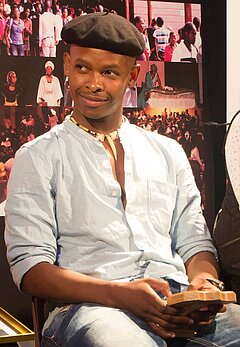
Photo: Thando Mchunu
What do you expect from the international Folkwang Shakespeare Festival?
I expect to learn a lot from the interaction with other theater practitioners, by investing time in my creativity and in working with other international students and mostly I plan to make this process fun while networking globally.
How do you prepare yourselves and the performance for the festival?
First, all of us in the cast speak indigenous African languages so English is not our home language. With a Shakespearean text we had to sit down with the director in November and analyze each and every word in the script and the implications, understand the English references, find analogies that provide a true or easy meaning through the spoken lines so that, as an actor I may execute it well and with fondness and great understanding. We have all put our hearts into this production in order to achieve a great performance and working with such a director, ‘who is cautious about delivering excellent work and always works so hard to help actors to achieve their best and look tremendously on stage’, means I have no doubt that we will shine.
Which character will you play?
I am playing two characters, ANTONIO and DOGBERRY. With twelve cast members and more than twelve characters, playing dual roles allowed some actors to explore more than one character. This demands quick shifts and transformational acting. Focus is therefore paramount. I found the crossing over from one character to another exciting and challenging, but most of all, I found it rewarding.
Which significance does Shakespeare have in your country?
We live in a country dominated by different cultures and eleven official languages. In my culture most of the people do not understand Shakespeare because of his “outdated” English. In order for us to make him understood we have to frame his work in a South African or in this province rather a Zulu context. His work resonates with our culture and the things that affect us on a daily bases, so some of us do find him interesting.
How up to date and therefore relevant is Shakespeare’s work and especially "Much Ado about Nothing" for you?
Shakespeare’s work speaks to everyone doesn’t matter which side of the world you are from. His works can be done anywhere, and make sense of the world, depending on the interpretation or angle or how you have strategized your context. Much Ado about Nothing is a very relevant play for me. It’s not just a comedy but something worth doing because of the topics of resolving civil strife, how love, jealousy and distrust can be manipulated by perception rather than facts, how bitterness manifests elements of resentment that distorts the truth, etc. The play discusses motivations that propel our interest in what happens every day worldwide, things people mostly choose to ignore, perhaps because they are indeed so close to our hearts.
Thobani Nzuza | School: Durban University of Technology, South Africa | Age 22 | Drama and Production Studies | third year of study | Antonio and Dogberry
Interview with Simina German, director of the Folkwang staging at the Folkwang Shakespeare Festival 2016
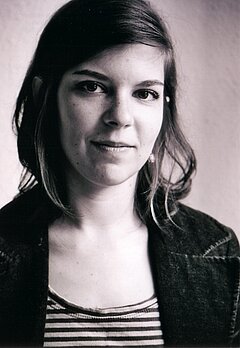
Photo: Katalin Moldvay
How do you prepare yourself for the international Folkwang Shakespeare Festival?
By rehearsing :)
Which significance does the festival have for the acting department of your school?
The very special thing is the exchange with young actresses and actors from different countries and cultures – this exchange is made possible in the frame of this festival. It is not that much about tools and something new which you should or can learn. It is about human issues, about communication, about performing together and also having fun.
What is the main idea of your performance?
We work in an empty, arena-like space – up to now without props – in which the actresses and actors are very much exposed and in which first of all everything or nothing is possible. As regards content, it is mostly about the questions of vanity and self-presentation.
Do you have expectations related to the time in Essen? Which ones?
I already performed in one of the Shakespeare Festivals as a student and therefore know the format even though it differs from time to time. I do not have any expectations. I’m simply looking forward to it and I’m excited that I will be involved as directress this time and therefore will experience the exchange on this level.
Do you have any associations when it comes to the Folkwang University of the Arts?
I think of my studies at Folkwang and that always there is music sounding out of the windows at the campus in Essen-Werden.
How do you exchange with the management of the festival?
We have the same basic version of the play as the other groups but for our performance I have continued working on it together with the director of the festival, Prof. Schmidt.
Interview with Nick James, student at The Victorian College of the Arts. University of Melbourne
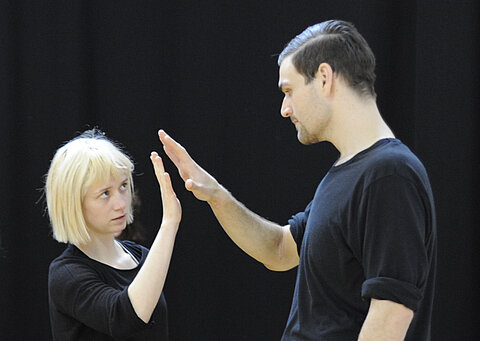
Photo: David Lang
What do you expect from the international Folkwang Shakespeare Festival?
I expect I will have the opportunity to meet and work with brilliant minds from all over the world at the international Folkwang Shakespeare Festival. It is a great opportunity to not only share work with others but also collaborate and learn from each other.
How do you prepare yourselves and the performance for the festival?
Preparation for a Shakespeare performance contains a lot of research before hand and a lot of ‘playing’ in the rehearsal room. We do a lot of textual work and homework for ourselves, but then put it all down and jump onto the floor with all of the work we have done simply performing the play.
Which character will you play?
I will play Benedick of Padua.
Which significance does Shakespeare have in your country?
Shakespeare explores emotions, events and relationships on every level of the human spectrum – from the giddy extremes of love, to the depths of sorrow – Shakespeare gives us the words to delve into what makes us human (perhaps greater than any one person in history thus far).
How up to date and therefore relevant is Shakespeare’s work and especially "Much Ado about Nothing" for you?
So long as humans have the capacity to ‘feel’, Shakespeare will be relevant.
Nick James | School: The Victorian College of Arts, University of Melbourne | Age 27 | Bachelor of Fine Arts – Theatre Practice | 2014-2016 (Current third and final year) | Benedick of Padua
Interview with Anna Mikuła, student at the PWST National Academy of Theatre Arts, Kraków
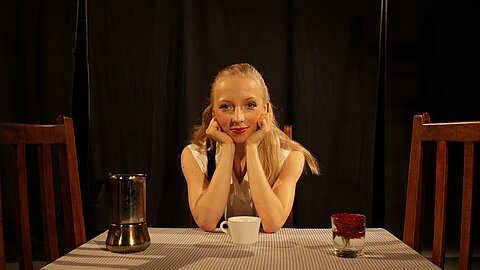
Photo: Jakub Urbański
What do you expect from the international Folkwang Shakespeare Festival?
I expect having the possibility of sharing my attempt to acting and using the body as an actress and dancer, as well as getting to know different approaches to that issue. I would like to watch performances of the three other teams and have the possibility to talk about their background, experience and way of thinking about theatre and dance. Our cultures are different, and because of that the way we perform, work and behave socially is also varied. What interests me is what type of warming up before the rehearsal or performance each team uses, what are the physical, voice or other exercises during the creation process or in their life as actors/dancers/students. The potentiality of workshops guided by each team would be a nice idea. I expect that during the festival we will become a community in which new ideas will arise from our collective passion.
How do you prepare yourselves and the performance for the festival?
I am working on the performance since January. I have finished the research weeks of exercising non-verbal, embodied way of getting to know the character. I got information about times in which Shakespeare lived and created his plays. I have read the text of the play many times – analysing not only my character, but also other people’s roles. After the premiere of our piece which is on 26th of February, I will have the opportunity to play it many times, using these chances to let the character develop inside me. Before coming to Essen I will read about the other teams coming there, to have an idea of their background and education, as well as refresh my knowledge about Shakespeare’s life and origin of "Much Ado About Nothing".
Which character will you play?
I will play Dogberry.
Which significance does Shakespeare have in your country?
William Shakespeare’s plays had significant influence on the Polish writers in the romanticism era, and as a result – on Polish people in these times. The keynote of romanticism in Poland is contained in Adam Mickiewicz’s poem "Romantyczność"- it is a quote from "Hamlet": "Methinks, I see... where? – In my mind’s eyes". In "Kordian" by Juliusz Słowacki there are references to "Hamlet" by moral crisis of the main character, and to "Macbeth" by introducing characters with supernatural power. Stanisław Wyspiański, another writer from romanticism era in Poland was writing his own interpretation of "Macbeth" as a result of fascination with Shakespeare in letters to his mother. Shakespeare contributed to the development of ideas of these Polish writers, and his plays are obligatory to read in Polish schools.
How up to date and therefore relevant is Shakespeare’s work and especially "Much Ado about Nothing" for you?
Conflicts that Shakespeare creates between people, considerations about choices and morality, prototypes of characters – all these issues and many more of them are still actual. Even if actions in his plays take place in the past, we can refer them to nowness and find paralells in e.g. behaviour of Sexton during the examination of Conrad and Borachio, to the worker in corporation or office, who doesn’t have time, wants clear and fast answers, gets impatient of people who waste his time. I think that the world is changing with an incredible tempo, but what stays the same are our instincts, emotions, ways of behaving which adopt to actual living conditions. That is why types of people from Shakespeare’s plays, in their all complexity and ambiguity, are universal.
Anna Mikuła | PWST National Academy of Theatre Arts Krakow, Dance Theatre Department in Bytom (Poland) | 22 years | actor of dance theatre | Semester of study: 7th | Dogberry
Interview with the festival director Prof. Hanns-Dietrich Schmidt, Vice-President for Events and International Affairs at the Folkwang University of the Arts
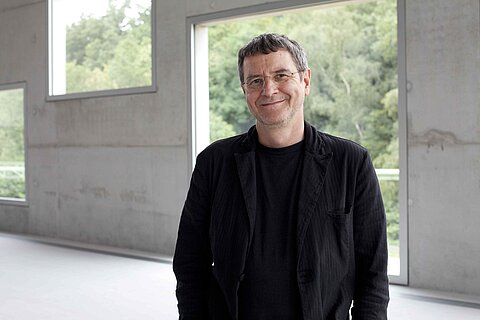
Photo: Heike Kandalowski
How did the festival come into being?
There is, indeed, a foundation myth. Roughly 16 years ago - and together with a partner school in Tashkent (Uzbekistan) - we reflected upon the options of realizing meaningful exchange on an international basis in “drama theatre”.
Our ambition was that the different languages should not be perceived as barriers and that the collaboration should go beyond the scope of mere guest performances. Consequently, the todays format of the Shakespeare Festival came into being - and is being realized this year for the 8th time.
What are the conceptual ideas and approaches of the Shakespeare Festival?
The concept is divided into two parts. First, all participating groups will present their national productions – here culture-specific approaches, methods, interpretations and emphases play a fascinating role, which is also attractive to the audience. The second part will be international. Within a few days, all students, directors and directresses will develop together an international multilingual performance in which everyone is involved.
How are the involved partner schools chosen?
Personal contacts and experiences are a crucial part of the selection process. It is a matter of quality, reliability and experience in international exchange. The partner schools also have to be ready to support their participation financially on no small measure. It is by now often the case that interested schools visit one of the festivals in order to get an impression of it before deciding upon their participation.
According to which criterion is the particular play chosen?
First of all – why Shakespeare? Every piece by Shakespeare can be staged with approximately twelve performers (incl. double cast). Furthermore, in Shakespeare’s plays the actor or actress is always the center of action. The stage – as in Shakespeare’s times – can be empty, which our format also requests. Everything develops through the performers and the language. So far on the choice of the author.
The piece is then discussed and selected in collaboration with the respective partner schools – so far we decided to stage “comedies” in most cases.
Why is it “Much Ado About Nothing“ this time?
After seven festivals this is one of Shakespeare`s last “famous” comedies which we have not staged yet. All participants were eager to work with such a complex and rich material.
How do the preparations look like?
Roughly one and a half year before the festival the partners and the play are decided upon. A shortened English version of the text then serves as the basis for the work of all participating groups. But there is no agreement on the concepts of each national version. The more diverse, the more appealing!
For the Folkwang University of the Arts it means working on the own production and simultaneously organizing all the arrangements for the participants’ stay: disposition, technical riders, transfer, accommodation, etc.
The rehearsal of our national production started in February.
What are the challenges of such an International Shakespeare Festival?
The potential challenges that are agonized in the preliminary stages are usually overcome through group dynamics during the festival. The participating directors and directresses as well as the students are accommodated together and thus they are in constant communication. It is important – and so far this always worked out well – that the festival is not regarded as a competition. It is about curiosity, openness, exchange and mutual experience and not about being “superior” or “inferior”.
Are there special moments from the preceding years that got stuck in your memory?
For some participants the festival means gathering first experiences abroad – for us, as the host of the festival, it means bearing a special responsibility – which we willingly and cordially accept.
There were a few group constellations that provided a unique exchange, for example during the festival in which students from the United States of America as well as students from Palestine were involved – topics of conversation were especially bound to occur here.
Is there anything you are especially looking forward to at the Shakespeare Festival 2016?
Besides the Polish group that already participates for the second time, this year we have two partner groups from South Africa and from Australia – continents that haven’t yet been represented at our festival.

